It seems we can’t find what you’re looking for. Perhaps searching can help.
Sign Up for newsletter!
Subscribe to get the latest eBook!
Hotline






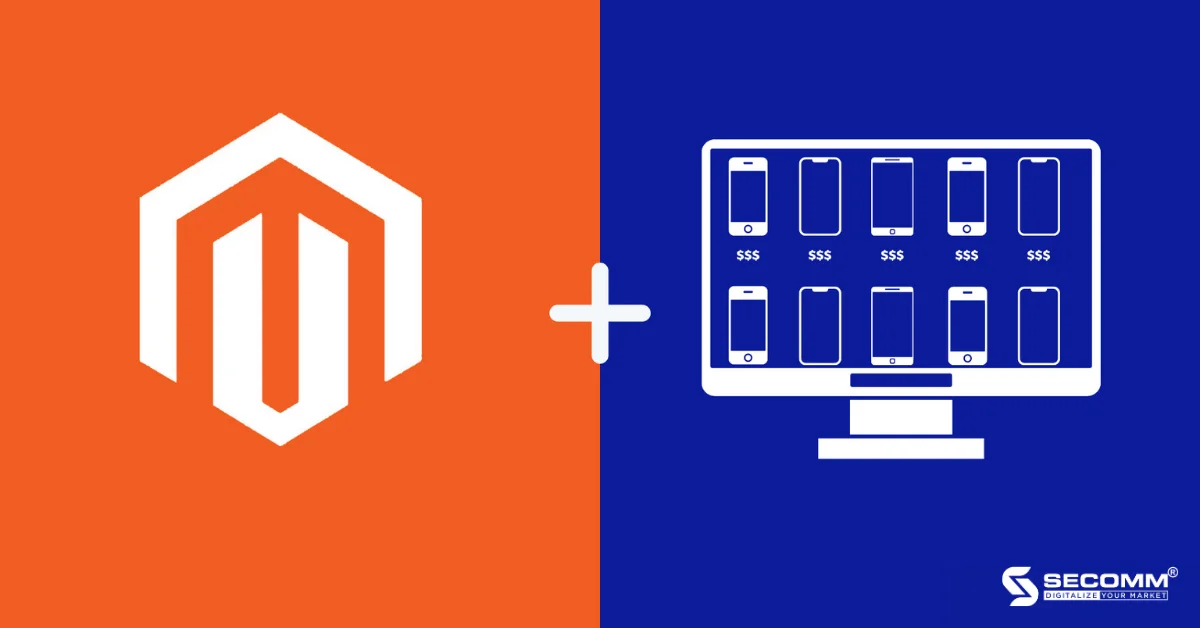
In 2022, the mobile phone retail market is predicted to reach sales figures of up to 1.39 billion units, marking a 3.8% annual increase (according to Trendforce). The Covid pandemic has significantly altered consumer interactions and shopping habits, shifting the purchase of mobile phones from offline to online. Traditional retailers have now caught up with this trend by embracing eCommerce to enhance their competitive edge and sustain growth regardless of the pandemic.
To enter the eCommerce market and seize competitive opportunities, businesses need to identify a suitable eCommerce platform aligned with their business objectives. Apart from popular names like Shopify, BigCommerce, Haravan, and WooCommerce, Magento is recognized as a platform chosen by major players in the mobile phone retail industry in Vietnam, such as CellphoneS, Phong Vũ, and Bạch Long Mobile. So, why is Magento the preferred choice for these businesses?
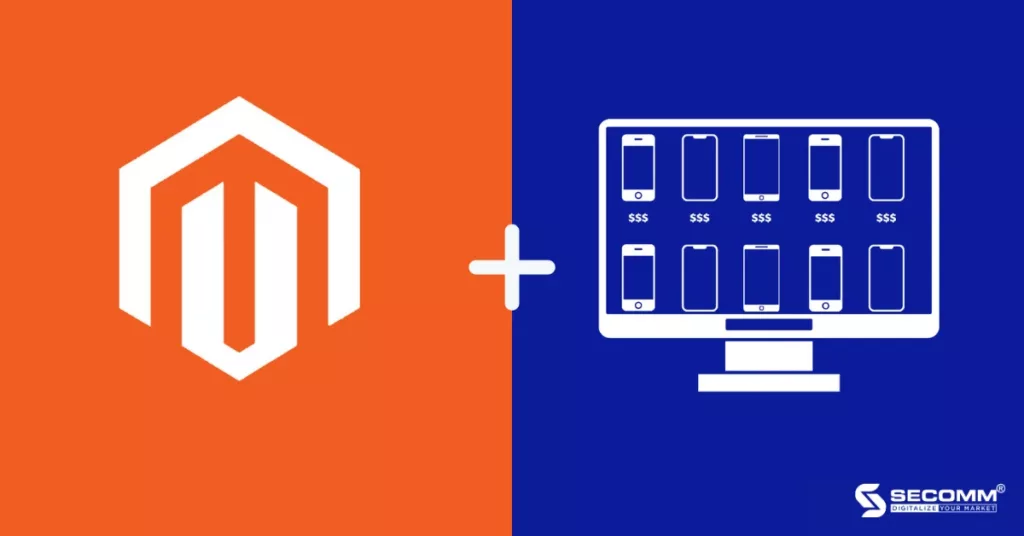
As a specialized eCommerce platform, Magento naturally offers a full range of basic features such as category management, content management, sales, customer management, marketing, inventory management, as well as reports and analysis. These features allow businesses to easily embark on their eCommerce journey in a short period.
Magento also possesses an ecosystem with many features supporting the development of in-depth mobile phone business systems.
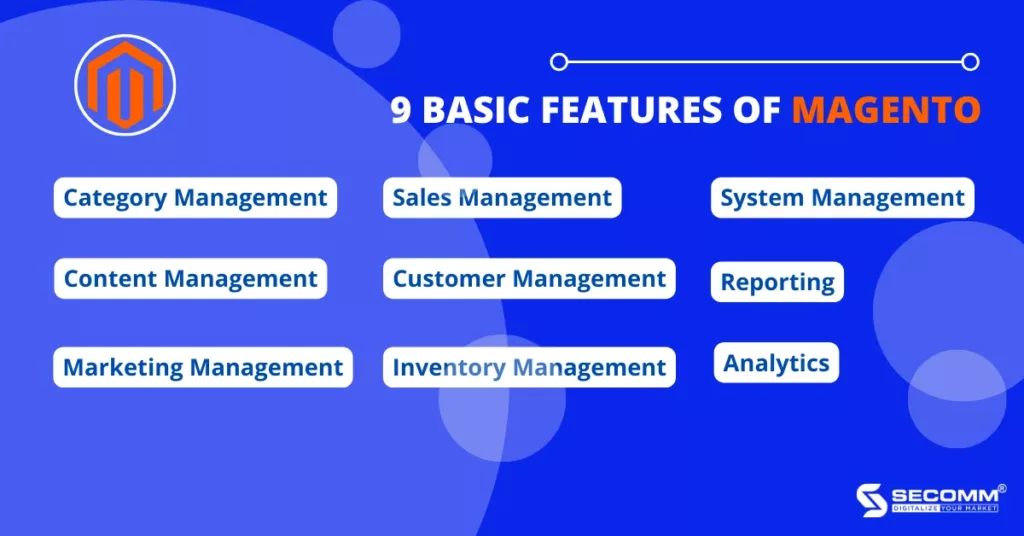
The Magento platform is known for its advanced features and extensive extensions developed to meet the rapid development of the eCommerce market and the specific requirements of each business. Thousands of advanced functions related to themes, add-ons, products, marketing, payment, shipping, etc., have been built with flexibility and high availability, delivering outstanding results when integrated into systems, meeting every operational need, and supporting the sustainable development of eCommerce for businesses.
Some advanced features for mobile phone retail that Magento supports include:
Flash Sale Feature: a discount mechanism for certain items or products within a specified time. The strategy of appealing to the customer’s psychology of “buy quickly, get a good price” is being effectively applied by many major mobile phone retailers. With Magento, businesses can easily create multiple Flash sales with countdown timers.
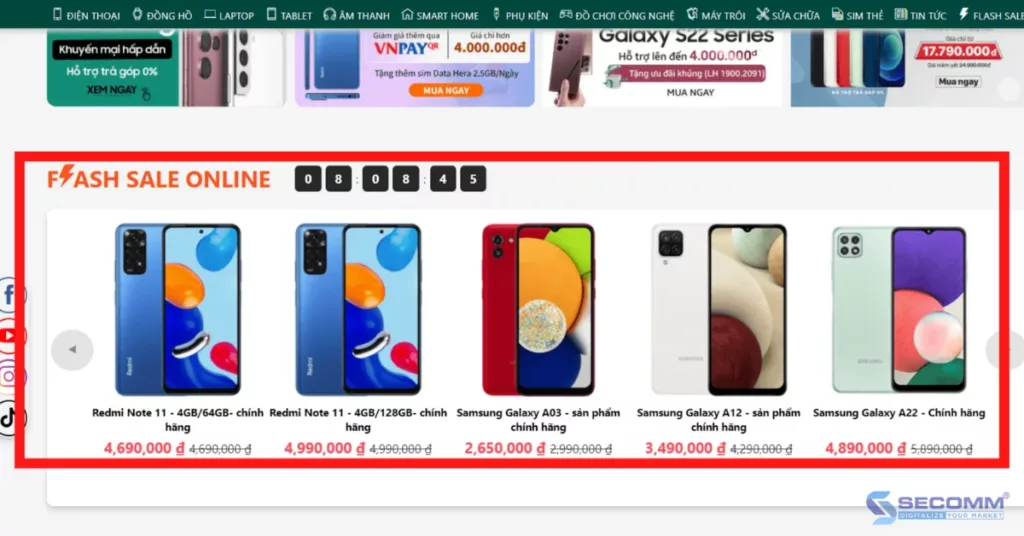
Buy Now Pay Later Feature: This is a popular payment method in the international online mobile phone retail industry but is relatively new in the Vietnamese market. After completing the order, customers will receive the product immediately, and the payment will be gradually made over a certain period with low or 0% interest. Breaking down the payment into instalments will reduce financial pressure on users when buying high-value products such as mobile phones, boosting the number of orders and revenue for businesses.
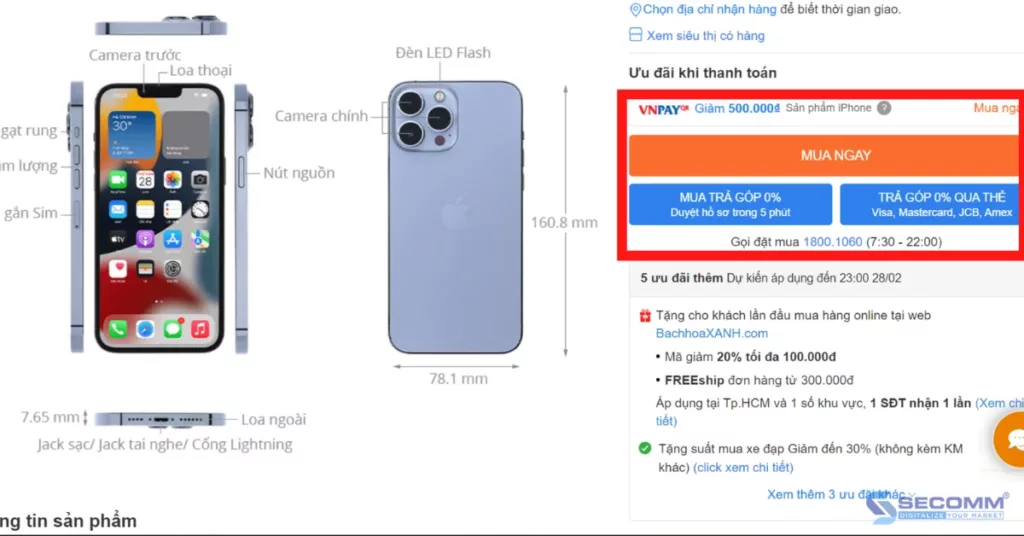
Advanced SEO Feature: In addition to supporting keywords, meta tags, descriptions, product titles, and searching for appropriate URLs, the Magento platform also updates ranking factors, provides URL structures, and offers meta deployment options to enhance SEO for eCommerce websites, increasing traffic and competitiveness in the market.
Mobile eCommerce is one of the industries that require an eCommerce website to have a sleek, standardized UI/UX interface with high aesthetics to convey brand and product values, attracting customers to shop within the system. Although Magento does not possess an extensive theme repository like some other platforms, each theme on the platform is meticulously and uniquely designed.
Businesses can choose to use these themes in the initial stages to save costs. To further refine the interface to better align with the brand’s positioning, businesses can customize based on the chosen theme or design a unique interface. However, this process will require more investment in terms of cost and time.
Magento supports stable system operation even when the website experiences a gradual increase in traffic over time or a sudden surge during business campaigns, with the capability to handle up to 500,000 products and thousands of transactions within an hour.
Furthermore, Magento also supports business expansion into multiple websites for various countries, all manageable on the same “dashboard.” This means that businesses can access and manage data for multiple websites/stores simultaneously using a centralized Magento system. With built-in language conversion support, businesses can build an eCommerce system with content and language tailored to diverse global customer demographics.
Moreover, the Magento system allows for easy conversion of currencies, supporting businesses in expanding their market presence across multiple countries and providing customers with a seamless transaction experience for optimal shopping.
In the eCommerce industry, especially in online mobile retail, having a variety of secure and flexible payment methods is crucial. Common payment methods include card payments (ATM, Visa, Mastercard), e-wallets (Momo, Zalo Pay), payment gateways (OnePay, VNPay, PayPal), cash on delivery (COD), etc. For delivery, Magento seamlessly integrates with various delivery services available both internationally and in Vietnam, such as FedEx, DHL, Giao Hàng Nhanh, Giao Hàng Tiết Kiệm, Viettel Post, along with popular shipment tracking applications. This ensures efficient handling and optimization of delivery processes. Furthermore, businesses can develop and customize new delivery features to align with customer preferences.
Aside from stable system operation during online business, efficiently managing products and orders is a crucial consideration for businesses. Integrating the website with enterprise management systems (ERP, CRM, etc.) minimizes manual operations and automates operational processes, ensuring high accuracy and operational efficiency for business development. Magento is highly compatible with various management software, such as POS (Square), CRM (Salesforce), and ERP (SAP, Oracle, Odoo), making it a preferred choice for many businesses.
One of the challenges in online mobile retail is intense competition, making it difficult to attract customers and climb the ranks on search engines. Magento can be seamlessly integrated with various marketing management software, ranging from email marketing tools (Mailchimp) to advertising platforms (Facebook, Google). Having a unified system for all sales channels on Magento enables businesses to easily control and leverage data, seamlessly transitioning business processes from offline to online. Consequently, businesses can develop and manage corresponding multichannel marketing strategies to personalize the customer experience and optimize eCommerce business.
Despite Magento being highly rated for its eCommerce features and performance, cost remains a significant barrier, preventing businesses from choosing the Magento platform for building e-commerce websites. It is estimated that a well-developed and efficient system on the open-source Magento e-commerce platform typically incurs deployment costs ranging from $10,000 to $250,000 USD.
Usage Cost Table for the First Year of Three Magento Versions:
Typically, a complete Magento project requires an implementation time frame of 3-6 months, sometimes extending up to a year. One reason for the prolonged development time is the complexity of the system’s functionality, demanding time to build suitable development solutions.
A fully functional and effective Magento website needs to be developed by an experienced team well-versed in Magento to build a comprehensive system and provide suitable solutions for the various long-term business requirements.
In summary, Magento is a comprehensive open-source eCommerce platform, specialized and suitable for various business models in the mobile electronic industry, including B2B, B2C, B2B2C, and D2C. Online mobile retail businesses can fully customize and control the system, from interface to features, providing the best experience for consumers through rich eCommerce features, a diverse ecosystem, and high flexibility and scalability.
However, budgetary constraints, time considerations, and the requirement for a highly skilled team also make it challenging for many businesses to utilize Magento for deploying eCommerce websites.
Contact SECOMM for a free consultation on developing an eCommerce system for mobile retail!
 2
2
 10,475
10,475
 0
0
 1
1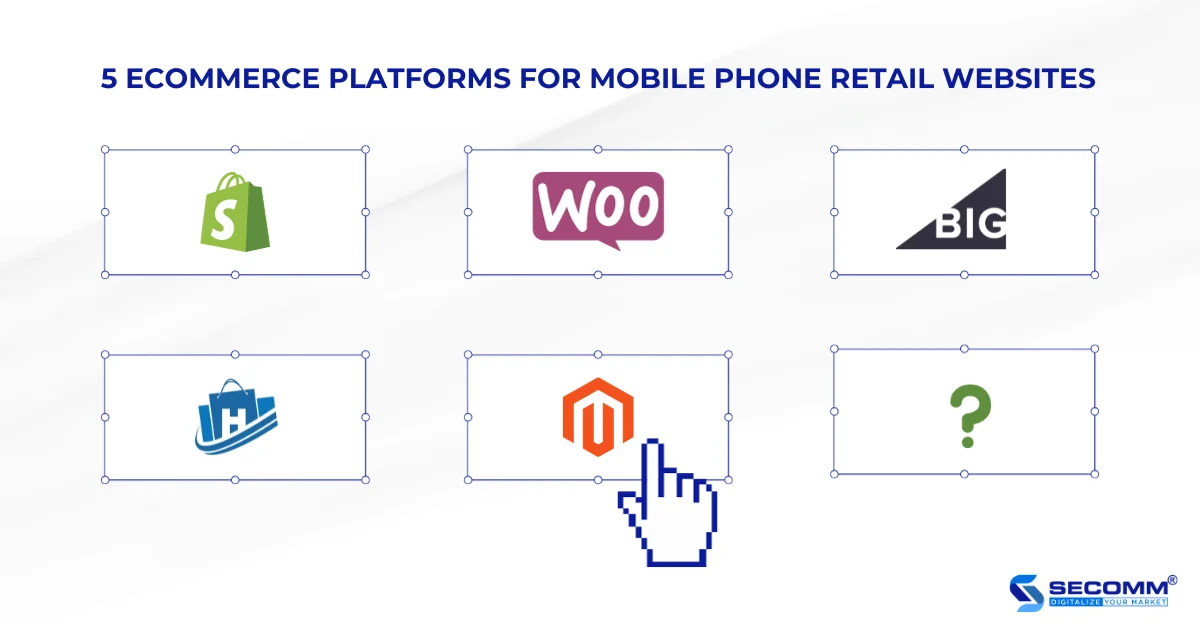
In recent times, eCommerce has been increasingly popular in the Vietnamese market and is becoming a potential business model pursued by many enterprises across various industries. Particularly in the mobile phone retail sector, the online market share of mobile phone retail systems is growing rapidly. For instance, The Gioi Di Dong – the largest mobile phone retail system in Vietnam, saw its online market share increase from 11.6% to 17.5% in just one month (from July to August 2021)
Nowadays, many mobile phone retail businesses in Vietnam often choose to implement eCommerce websites as their main channel in online commerce. Thanks to the effective development of website systems, many mobile phone retail businesses have not only seized the opportunity to boost revenue but also achieved sustainable business growth. The common factor contributing to this success lies in the eCommerce platform.
Each type of eCommerce platform has its unique features that can support businesses in developing their online presence. Software as a Service (SaaS) platforms are designed by providers with the entire system pre-built, including hosting, interface, features, and infrastructure maintenance. Therefore, businesses can easily build and operate a website system without much concern for technical issues and without investing too much time and money from the outset.
However, businesses using SaaS platforms will not own the source code and data, and the system’s scalability and integration capabilities are limited. Usage costs may increase over time. On the other hand, open-source platforms give businesses full ownership and control over the source code and data, allowing freedom in designing interfaces and offering high scalability and flexibility. Nevertheless, using open-source platforms often requires a specialized development team and more investment in terms of cost and time.
So, which eCommerce platform will be suitable for mobile phone retail businesses?
The user interface of an eCommerce system is considered the face and highest scoring aspect in online business. Therefore, besides meeting UI/UX standards and expressing the brand’s characteristics, products, businesses also need to focus on the presentation of product images on the website, ensuring synchronization and clarity.
This ensures a complete and satisfying experience for customers. The admin interface must be user-friendly, allowing easy navigation, control, and management of all data within the system.
With online retail of mobile phones, the eCommerce system’s feature set needs to be diverse, ranging from basic to advanced and specialized, aiming to provide an optimal experience for buyers and facilitate the efficient and sustainable development of the eCommerce system.
Some essential functions in the eCommerce website system for mobile phone retail businesses include:
To have a seamless online business system, businesses often need to integrate eCommerce platforms with other software and technology platforms they are currently using, such as:
The chosen eCommerce platform must have flexible, seamless, and effective integration capabilities with this software without affecting the execution level of each system. This integration helps businesses overcome the limitations of manual operation and increases automation for both back-office management and sales, ensuring high accuracy and operational efficiency for business development.
eCommerce platforms need to have high scalability to adapt and grow alongside businesses of all models. Choosing the right platform can accompany businesses from startup and SME stages to becoming large enterprises, and from B2B, B2C, and D2C models to B2B2C, helping save long-term budget while still building a sustainable, efficient system suitable for the business.
High scalability meets all future development needs of the business, such as expanding multiple websites, across countries, currencies, channels, etc. Moreover, platforms with high scalability ensure stable system operation regardless of increasing traffic and transactions over time.
Shopify is a well-known giant in the field of building eCommerce systems as a Software as a Service (SaaS). This platform is favoured for its user-friendly nature, quick build time, and low initial costs, making it suitable for many SMEs.
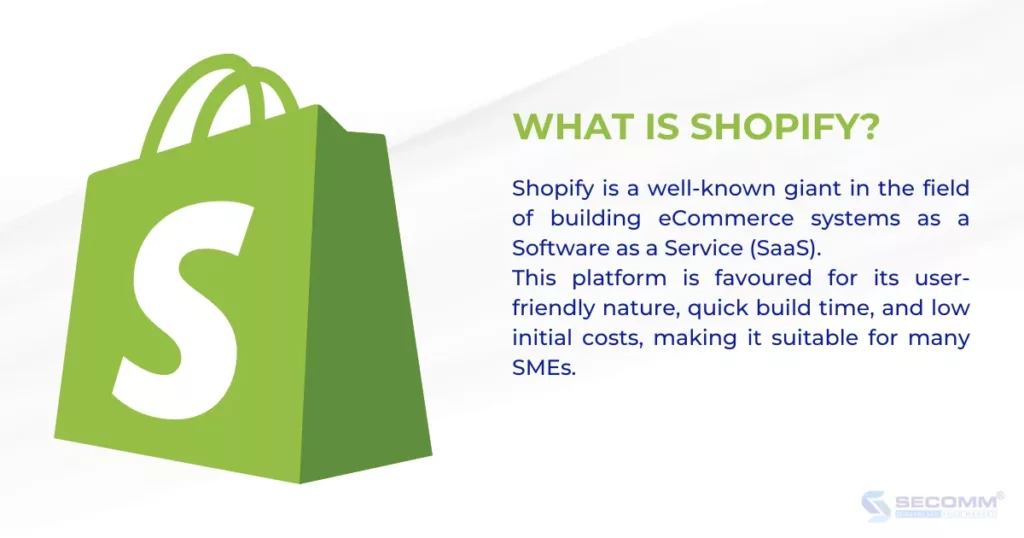
Shopify provides attractive, responsive themes suitable for various industries, including mobile phone retail. While adhering to UI/UX standards, it lacks customization options for businesses to showcase their unique branding.
The admin interface is user-friendly on desktops, allowing easy management of the website’s aspects. However, mobile functionality is limited, restricting businesses to perform specific functions on the mobile version.
Shopify’s functionality system is comprehensive, meeting both the basic and advanced needs of small and medium-sized enterprises. However, accessing advanced features requires additional monthly payments, leading to increasing usage costs. Shopify, however, lacks certain features crucial for mobile phone retail, aside from instalment payment options.
Shopify restricts access to the source code, making integration with third-party software challenging. Businesses can only integrate with partner software available on the platform or those directly developed by Shopify.
Scalability on the Shopify platform is limited because businesses cannot modify or upgrade the website source code. Therefore, it’s often used by mobile phone retail businesses in their early stages.
Shopify offers various service packages to cater to different business needs, ranging from $29/month for Basic Shopify to $2000/month for Shopify Plus. However, businesses may face limitations in advanced features, necessitating a platform switch for a specialized and sustainable system.
→ Overall Rating based on 5 criteria: 2/5
Shopify is suitable for SMEs that want a cost-effective and quick eCommerce system. However, it falls short in advanced features, specific functionalities, and customization options. Businesses must accept the limitations and be prepared to switch platforms for a tailored and sustainable solution in the future.
WooCommerce is an open-source CMS plugin for WordPress introduced in 2011, completely free, enabling businesses to turn their WordPress websites into online stores.
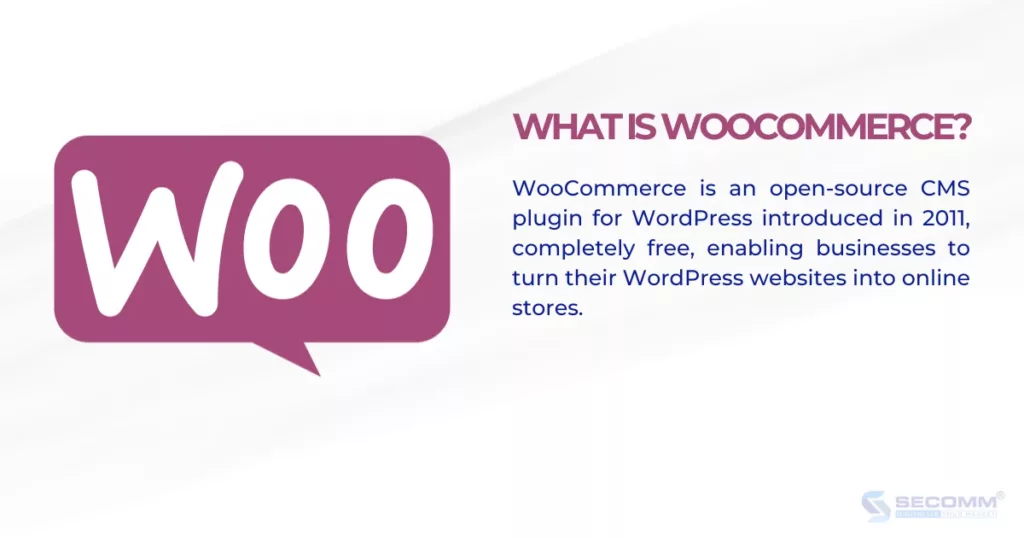
WooCommerce offers a diverse library of templates for mobile phone retail and electronic goods, designed meticulously and user-friendly. This allows businesses to conveniently design and build an eCommerce system from the start without requiring in-depth technical knowledge.
Because WooCommerce is a WordPress plugin, administrators continue to manage the website through the WordPress interface, making it easy for businesses already using WordPress to adapt, use, and navigate the system.
WooCommerce has many features, both basic and advanced, to support businesses in operating an eCommerce website. However, the platform has some limitations regarding specific features for mobile phone retail. Although it’s open-source, developing unique features on WooCommerce can be challenging and may lead to system instability.
Third-party software integrates well with WooCommerce, helping businesses save time, and costs, improve operational efficiency, and automate management processes.
WooCommerce’s most significant drawback is its limited scalability. The platform tends to become unstable and easily overloaded when there are more than 2,000 SKUs or too many themes and plugins on the system.
WooCommerce is an open-source platform, so it’s entirely free to use. However, businesses need to pay for additional services such as domain registration ($15), hosting fees ($120/year), and system development costs (ranging from $3,000 to $10,000, depending on system complexity).
→ Overall Rating based on 5 criteria: 3/5
WooCommerce is a good platform for businesses currently using WordPress and looking to develop an eCommerce system. However, the platform has limitations in customization and adjusting unique features. Intervening in the system is likely to cause instability, and there is a high probability that the built-in features are not compatible with the platform. Additionally, to customize the system based on the existing feature set, businesses will need to invest a significant budget and time.
BigCommerce is a SaaS platform based in the USA with over 600,000 online stores used by consumers worldwide.
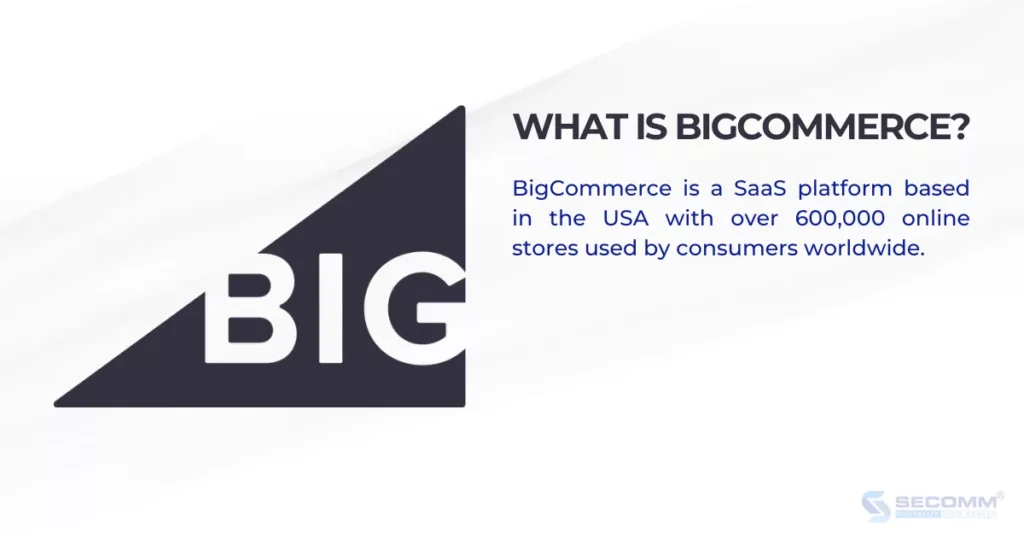
BigCommerce possesses a diverse theme repository with over 160 templates, catering to various industries, including mobile phone retail and electronics. All these templates are designed following UI/UX standards, allowing for easy adjustments to fit the brand.
For the administrator interface, businesses can manage their stores on a real-time and easily trackable screen.
BigCommerce’s functionality is relatively comprehensive, meeting basic and advanced needs, as well as specific features for mobile phone retail businesses. However, since BigCommerce is a SaaS platform, businesses cannot modify the source code or develop additional features not already available on the platform. Businesses can only use the features provided by BigCommerce or those offered by the platform’s partners.
Some notable advanced and specific features available on BigCommerce suitable for mobile phone retail businesses include multi-currency support, advanced SEO, rating and review features, advanced reporting, and instalment payment capabilities.
BigCommerce has a relatively high integration capability, allowing integration with many popular third-party software to support business operations.
Some software that can be integrated with BigCommerce includes various payment gateways (Stripe, PayPal, ApplePay, Checkout), shipping solutions (ShipStation, Amazon Shipping, Easyship, Route), ERP systems (NetSuite ERP, Acumatica Cloud ERP), CRM (HubSpot, Revamp), and marketing tools (email marketing, social media integration).
The system’s scalability depends on the BigCommerce service package that the business is using. The platform can support business expansion into new markets, multiple currencies, and languages. Additionally, BigCommerce can support stable system operations for businesses handling thousands of SKUs.
BigCommerce currently supports three bundled solutions and one on-demand solution:
→ Overall Rating based on 5 criteria: 3/5
BigCommerce is almost a comprehensive SaaS platform for businesses entering the mobile phone retail eCommerce journey. The platform can be suitable for various business models, including B2B, B2C, and B2B2C, depending on the chosen subscription package. However, the limitation of using this platform is that businesses are restricted in their ability to customize functions on the system, limited in annual revenue with each subscription tier, and unable to own the source code.
Haravan, founded in 2014, stands as one of the renowned platforms in the Vietnamese market, boasting over 50,000 businesses and consumer brands. It operates as a service platform modelled on Shopify.
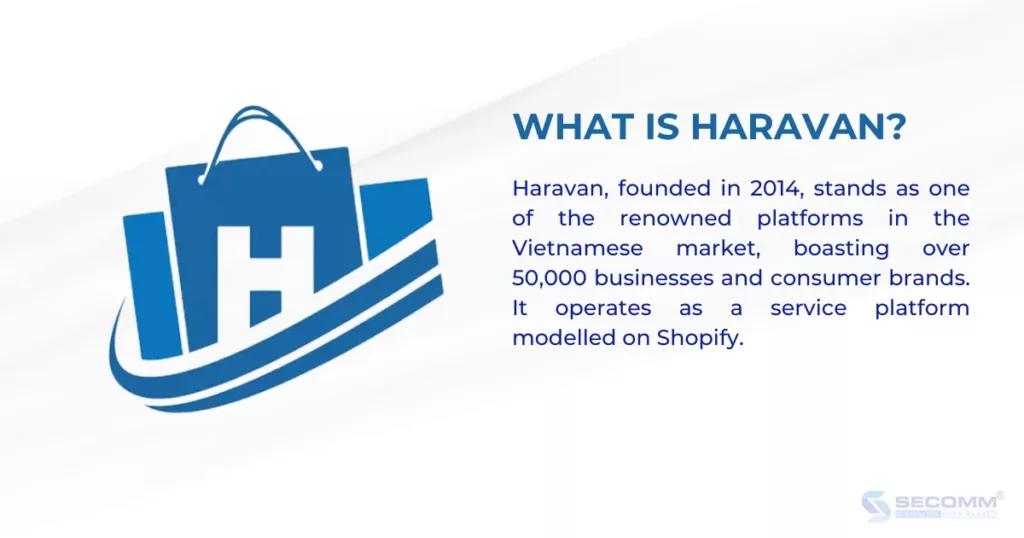
Similar to other SaaS platforms, Haravan boasts a diverse theme repository with over 400 templates, all designed following UX/UI standards. Beyond that, businesses can customize the interface to align with their distinctive brand identity. The admin interface, supporting the Vietnamese language, ensures a user-friendly experience for businesses.
Haravan offers a comprehensive set of both basic and advanced features, enabling businesses to swiftly establish an eCommerce website. The platform includes specific functionalities tailored for mobile phone retail, such as installment payment options. However, akin to Shopify and BigCommerce, businesses cannot develop additional features beyond what Haravan offers in its repository.
Integration with third-party utilities outside Haravan’s ecosystem can be challenging, representing a significant limitation of service-type platforms. However, it does support integration with widely used services in Vietnam, including various payment methods (Momo, VNPay, ZaloPay, etc.), shipping services (Giao Hàng Nhanh, Viettel Post, DHL), and management tools (CRMViet, Teamcrop).
Haravan’s scalability is limited; it supports multilingual and multi-currency features but lacks the capability to expand to multiple websites or efficiently manage extensive data on the platform.
To use Haravan, businesses need to pay a reasonable monthly fee ranging from 200,000 VND to 3,000,000 VND, depending on business needs:
→ Overall Rating based on 5 criteria: 3/5
Haravan is a suitable platform for businesses in Vietnam with limited technology experience and budget constraints. However, as businesses grow, Haravan may not provide sufficient functionality to sustain operations. Eventually, transitioning to more specialized platforms like Magento, WooCommerce, or OpenCart becomes necessary, albeit with challenges such as costs, time, and human resources.
Magento is an open-source eCommerce platform with deep expertise in online commerce. It currently offers two versions: Open Source (free) and Commerce (paid). Recognized as one of the most comprehensive eCommerce platforms, Magento boasts diverse features, high flexibility, scalability, a diverse ecosystem, and optimal security.
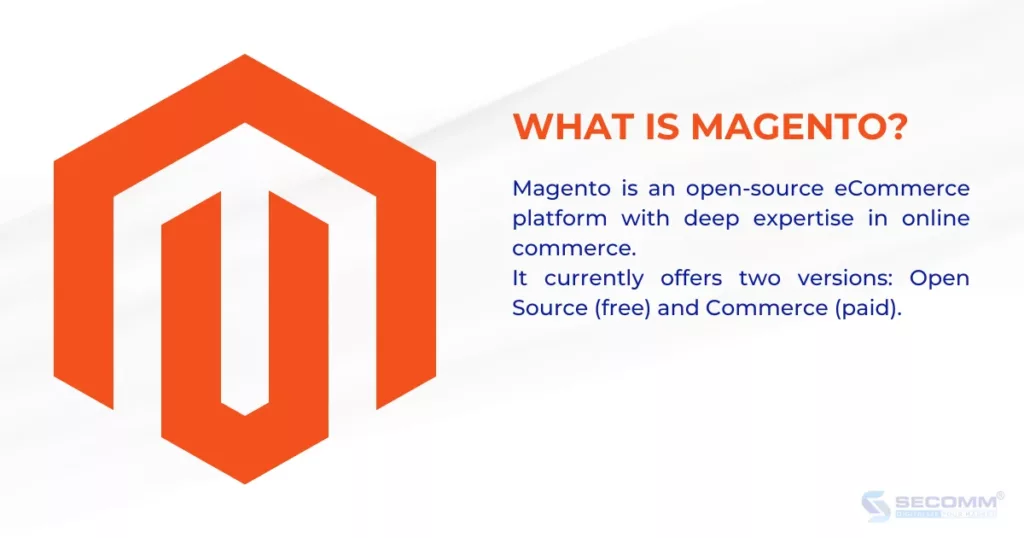
Unlike other platforms, Magento doesn’t have an extensive theme repository. However, each theme is meticulously designed, unique, adheres to UX/UI standards, and emphasizes high aesthetics to convey brand and product values, attracting customers to the system.
Businesses can save costs and time by using available themes, while also having the option to customize for brand identity. Additionally, businesses can fully design their interface, enhancing brand recognition, though this requires careful investment in design time and costs.
For the admin interface, Magento 1 was criticized for being challenging to use. However, Magento 2 introduced a more intuitive dashboard, making navigation easier, user-friendly, and adaptable.
Magento’s eCommerce platform has a diverse and deep feature system, catering from basic to advanced and specific functions. This allows mobile phone retail businesses to easily and rapidly build and develop their system in the short and long term. Basic functions include Category Management, Content Management, Customer Management, Marketing Management, Order Management, Store Management, System Management, Cart and Checkout, and Reporting & Analysis.
Specialized features include support for multiple languages, currencies, stores, Progressive Web Applications (PWA), Multi-Source Inventory (MSI), ElasticSearch, etc., enhancing the customer experience and accelerating the shopping process.
Magento excels in easy integration with third-party software for payments (credit cards, e-wallets, payment gateways, cash on delivery), shipping (Fedex, DHL, local carriers), management software (POS, CRM, ERP), and marketing tools (email marketing, advertising).
Magento ensures stable system operation even with increasing traffic over time or sudden spikes in business campaigns. It can handle up to 500,000 products and thousands of transactions within an hour. Magento supports the expansion of multiple websites for various countries, all manageable on one screen, allowing businesses to access and manage data for multiple websites/stores simultaneously.
One significant limitation for mobile phone retailers opting for Magento is the high initial development cost. A fully functional Magento system development is estimated to range from $10,000 to $100,000. Beyond complex and advanced features, the need for an experienced professional team contributes to the higher implementation costs compared to other platforms.
→ Overall Rating based on 5 criteria: 4/5
Magento is a comprehensive platform suitable for mobile phone retail businesses, whether B2B, B2C, or D2C, especially those with an existing customer base and a desire to develop a long-term eCommerce system. With Magento, businesses can continuously develop components of the eCommerce system, ensuring optimal performance and sustainable growth.
Choosing the right platform for eCommerce is crucial for mobile phone retailers. An accurate choice helps businesses shorten development time, save costs, and maximize resources to achieve the highest revenue levels. SECOMM understands the challenges facing mobile phone retail businesses and provides expert advice.
Contact SECOMM now for a free consultation!
 2
2
 11,717
11,717
 0
0
 1
1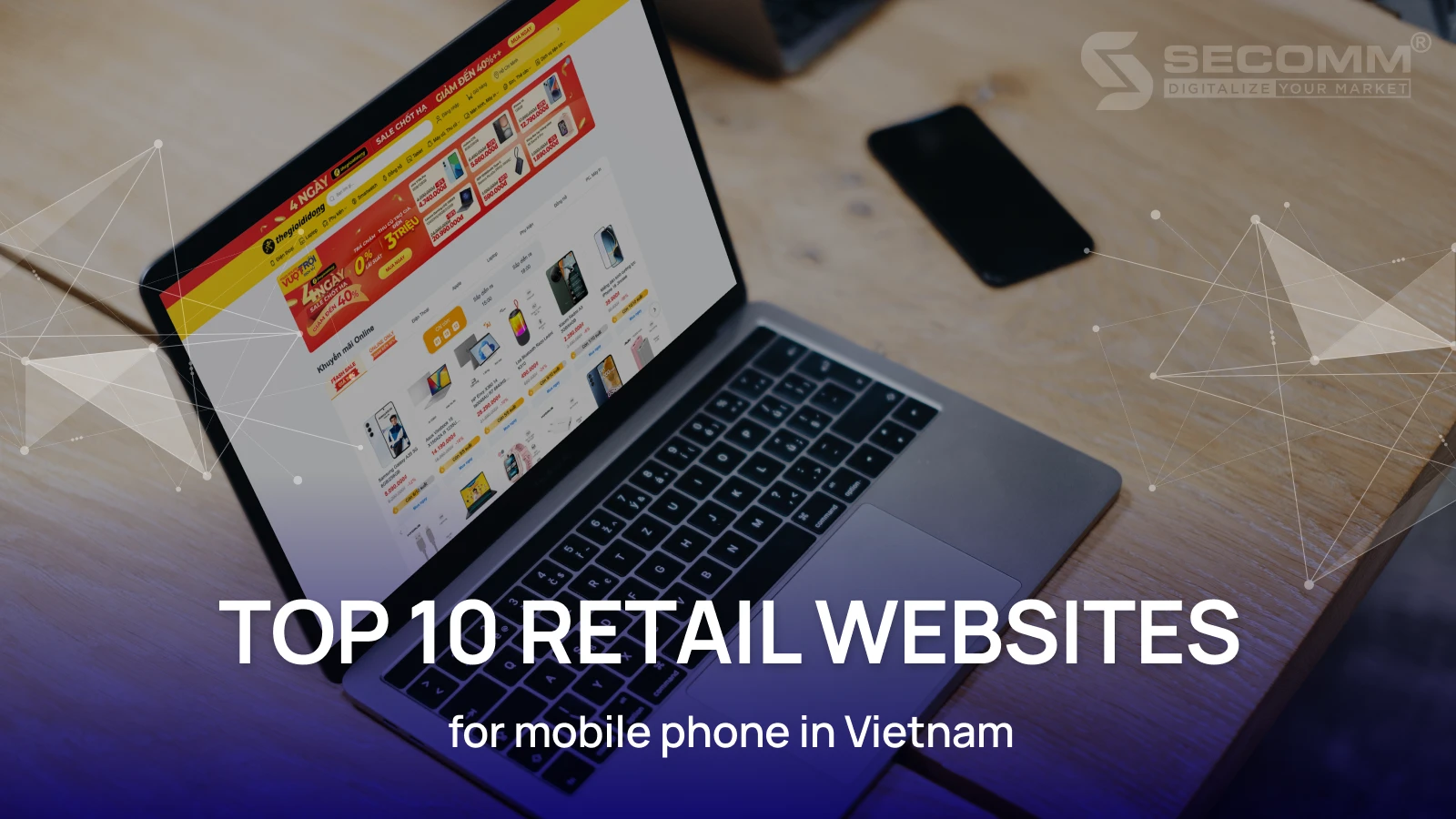
The retail market for mobile phones in Vietnam is booming like never before! With 61 million users, Vietnam is currently among the top 10 markets with the highest mobile phone usage in Asia. Furthermore, this market is predicted to grow in 2022 by 47.5% (according to Trendforce).
Taking advantage of this opportunity, many retail businesses in Vietnam have achieved tremendous success and continuously expanded their scale, such as The Gioi Di Dong, FPT Shop, Viettel Store, etc.
To contribute to this success, one cannot ignore e-commerce. Online sales channels such as websites, mobile apps, and e-commerce platforms play an increasingly important role for retail businesses in the mobile phone industry, especially post-pandemic.
According to Debasish Jana, an expert from the market research company Counterpoint Research, online sales of mobile phones have increased compared to the same period last year, accounting for 14% of the total market share. Not stopping there, the growth rate of online mobile phone retail is projected to increase even further shortly, reaching 29% by 2025 (according to Google, Temasek, Bain & Company).
E-commerce helps retail businesses develop their business models and contributes to revenue growth for enterprises.
The Gioi Di Dong is a brand under the company The Gioi Di Dong Joint Stock Company, established in 2004. According to Euromonitor International, The Gioi Di Dong is the largest online retail company in Vietnam, holding a 10% market share. It is also the leading retail chain for mobile devices in Vietnam, with approximately 1,000 stores present in all 63 provinces and cities nationwide.
Currently, this retail business is heavily investing in online sales systems such as websites and apps.

CellphoneS is a retail system for well-known technology products in Vietnam. Currently, the business has a presence in Ho Chi Minh City, Hanoi, Binh Duong, Hai Duong, Hai Phong, Bac Ninh, Vinh Phuc, Thai Nguyen, and Vung Tau.
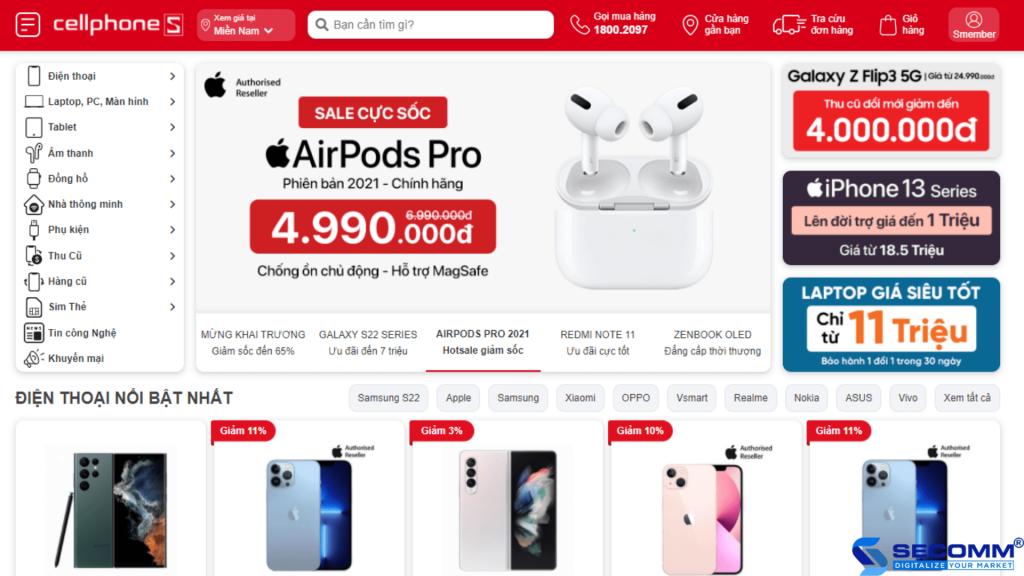
FPT Shop is under the ownership of FPT Corporation Vietnam, established in 2012. It is an officially authorized dealer of Apple in Vietnam at the highest level, specializing in providing genuine electronic products. Currently, the retail chain system spans across the country with stores in all 63 provinces and cities.
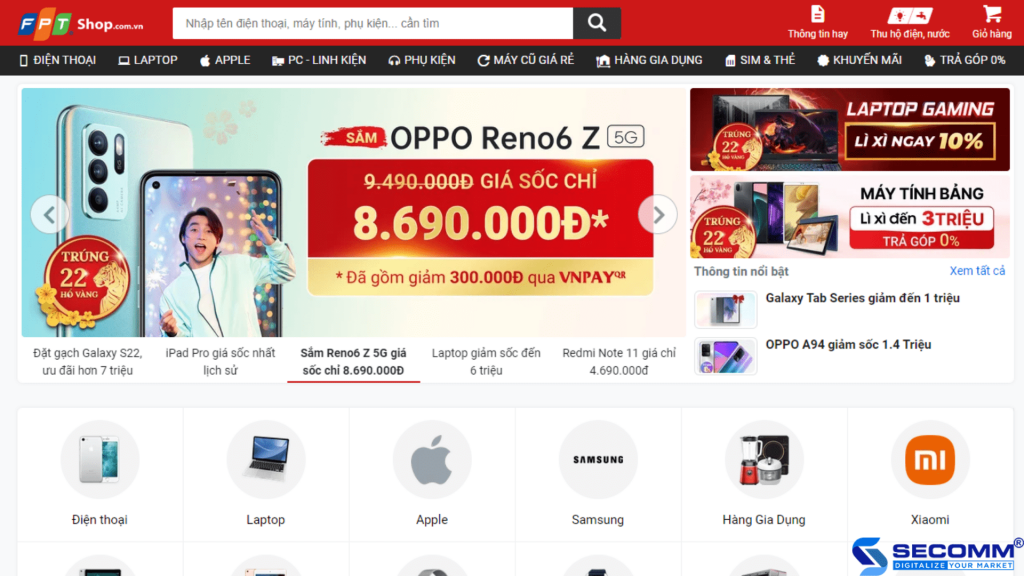
Hoang Ha Mobile is a retail system specializing in providing genuine technology products and well-known mobile phones in Vietnam, established in 2014. Currently, the business has over 90 branches spanning from the North to the South.

The Mobile Technology Company Limited operates the Didongviet.vn retail chain, established in 2009 as a reputable system specializing in genuine technology products, notably mobile phones, tablets, laptops, accessories, and components.

Viettel Store was launched in 2009 with thousands of continuously updated products to meet the online shopping needs of customers nationwide. With over 200 stores, Viettel Store’s retail system provides a wide range of high-tech devices and products, including mobile phones, laptops, tablets, and medical equipment.
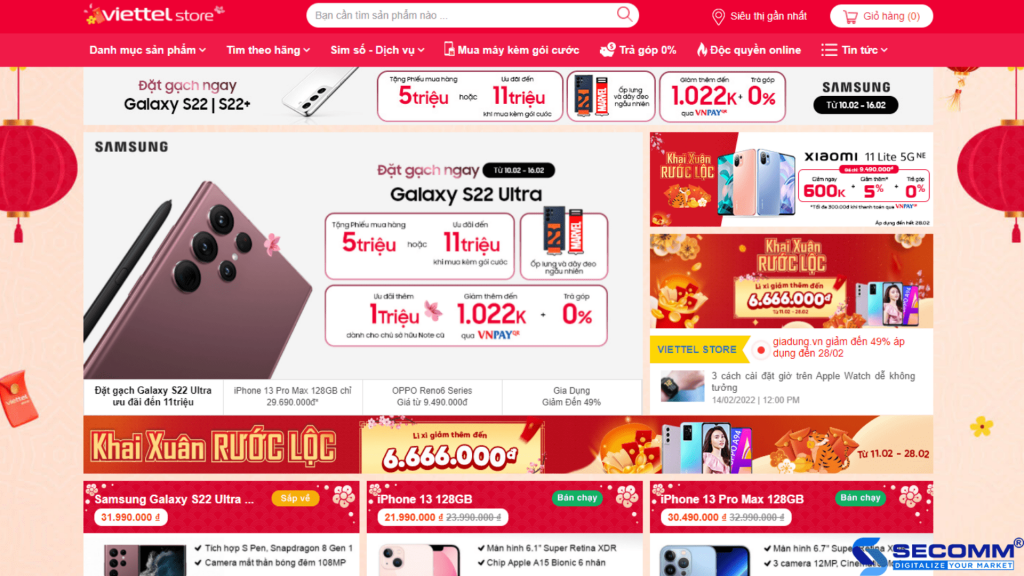
Sony is one of the most globally renowned brands in consumer electronics, thanks to its revolutionary innovations and product quality. After 21 years in Vietnam, Sony has established a retail system consisting of 11 Sony Shops and Sony Centers, over 160 official dealers, and 70 authorized service stations spread across the country.
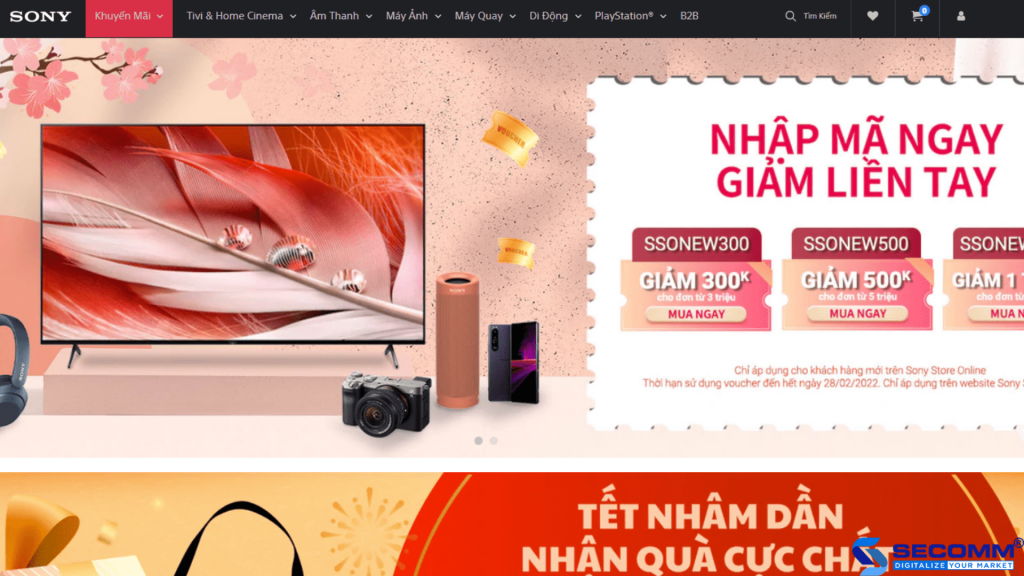
Phong Vũ is known as a long-established and reputable retail unit in Vietnam since 2007, with over 30 stores nationwide. Specializing in the business of information technology products, gaming and entertainment devices, office equipment, and high-tech devices from various major brands.

Mobile City is one of the popular retailers of smartphones, tablets, and technology accessories in Vietnam, with over 10 years of experience.
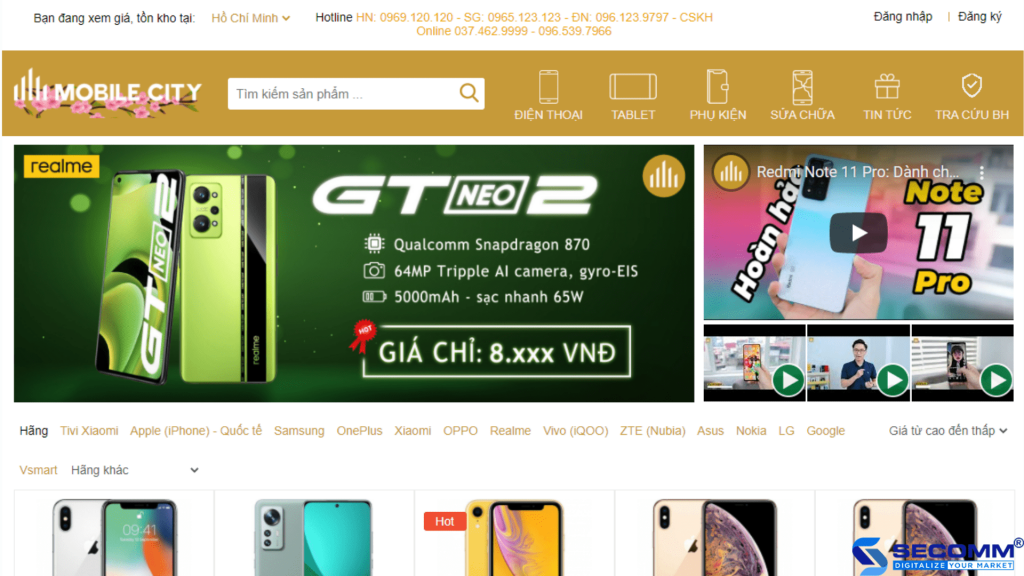
Clickbuy is a retail system offering well-known technology products in Vietnam, established in 2012. Currently, Clickbuy has expanded to include 5 stores and 2 modern service centers in Hanoi and Ho Chi Minh City.
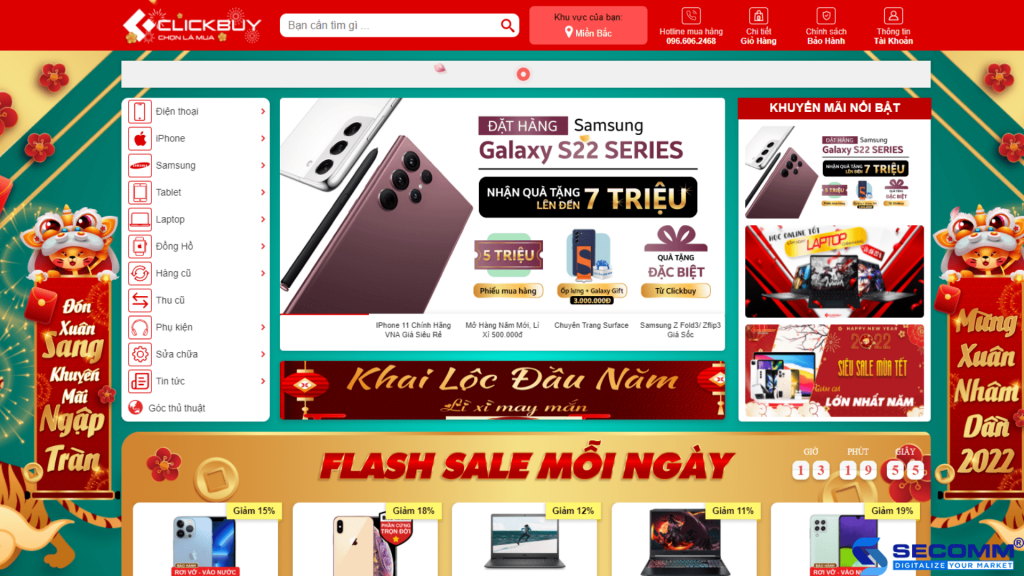
Online business in the mobile phone industry presents numerous growth opportunities. However, to succeed, businesses need a partner with extensive experience in the e-commerce landscape.
With a successful track record in implementing complex e-commerce systems, SECOMM understands the challenges that businesses face.
Contact us now for a free consultation on comprehensive e-commerce system development solutions!
 45
45
 42,269
42,269
 0
0
 13
13Subscribe to get the latest eBook!
Hotline